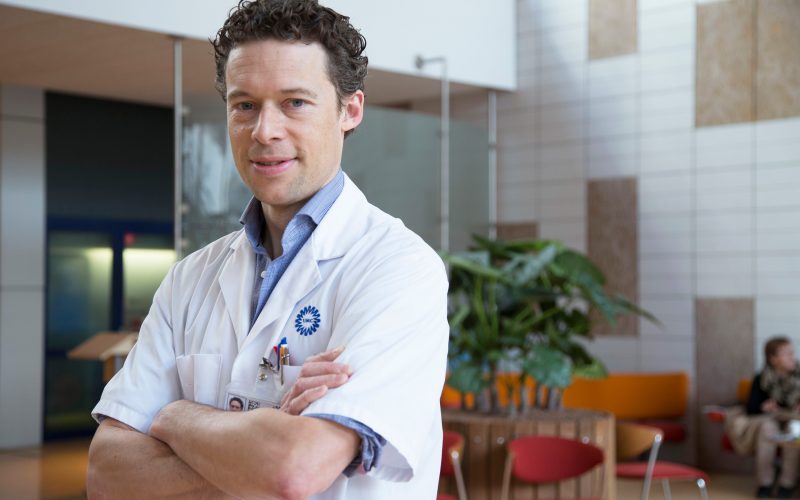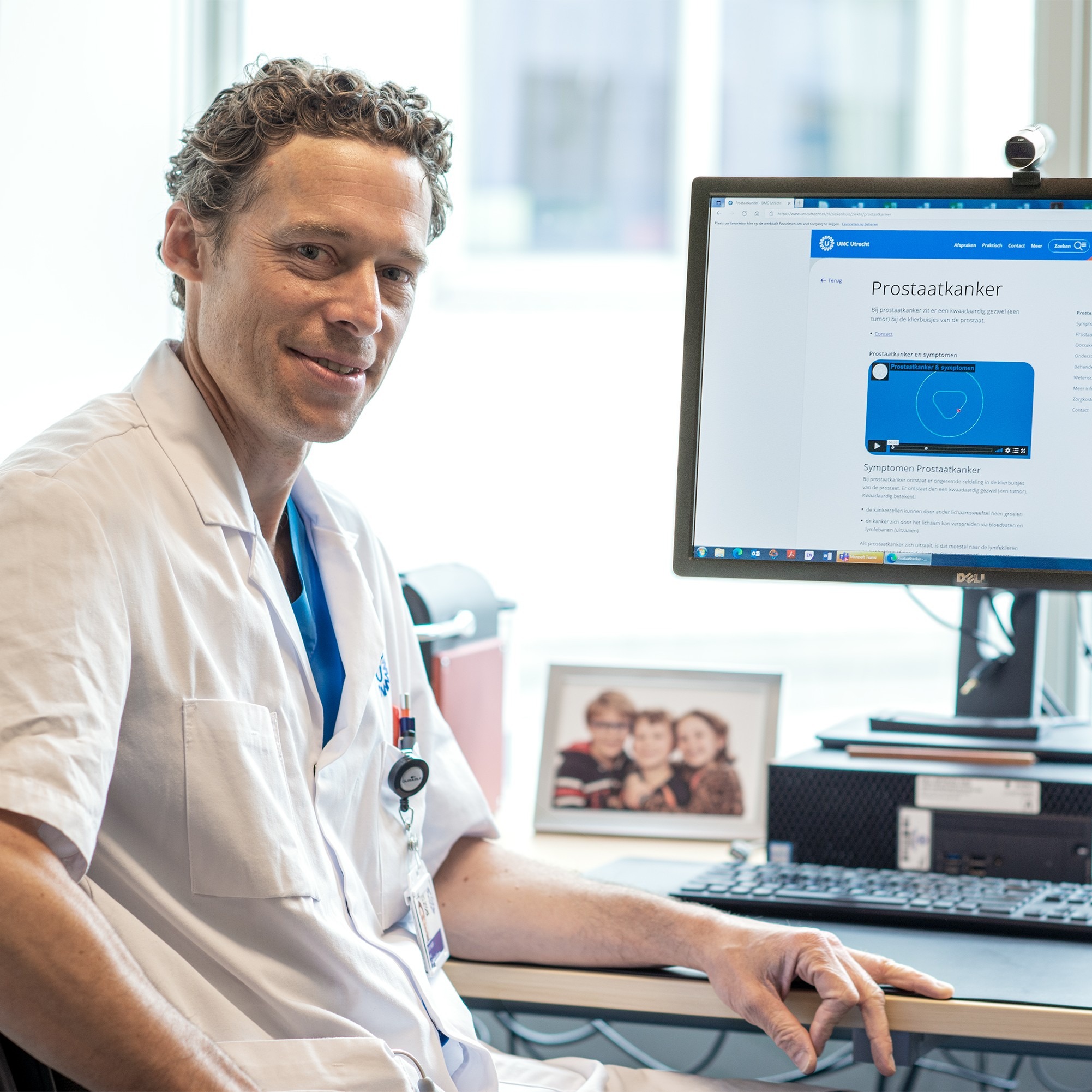To improve the treatment of bladder cancer, prostate cancer, testicular cancer and other urological tumors with the latest scientific insights and technological innovations. Plus: tailoring care more to each individual patient. These are the goals of Richard Meijer, UMC Utrecht’s new professor of Oncological Urology.
Oncological urologist Richard Meijer has been head of the Department of Oncological Urology at UMC Utrecht since 2018. His appointment as of 1 November 2025 is an important step in the further strengthening of UMC Utrecht as a nationally and internationally leading and innovative center in urogenital cancer (tumors of the urinary tract and male genital organs). From mini-bladder cancer tumors to regional cooperation and from robotic surgery to AI: what will Richard be working on in the coming years?
Richard leads a research group that – the first in the world – to grow mini-bladder tumors from the urine of bladder cancer patients: bladder cancer organoids, or urinoids. The genetic properties of a urinoid correspond to the patient’s original bladder cancer. This offers doctors the opportunity to test how a tumor will respond to a certain (order of) treatment(s) without having to put extra strain on the patient him/herself. They can better monitor and predict possible changes in tumors under the influence of medication. This allows treatment options to be better tailored to the individual patient. And the researchers can better analyze why some patients are (or become) resistant to certain medications. This is a big step forward in personalizing bladder cancer treatment.
“At what point do we give chemotherapy, and when do we start immunotherapy or a combination with targeted therapy (drugs that target specific cancer-stimulating proteins – ed.)? Do we operate first, or do we first give systemic therapy (treatment that affects the whole body, such as chemo and immunotherapy, as opposed to surgery and radiation – ed.)? When is it better to opt for radiotherapy? We want to develop this further in the coming years,” says Richard. “By treating patients in a more customized and personalized way like this, we can better understand bladder cancer, reduce side effects and improve treatment outcomes faster.”
Richard’s team is doing the urinoid research within the UMC Utrecht Laboratory for Translational Oncology (LTO). Here, the clinic (patient care) and the laboratory work closely together: doctors, nurses and researchers join forces to find and apply the best treatments for patients with cancer more quickly. They also join forces with other research institutes of the Utrecht Science Park, such as the Hubrecht Institute and the Faculty of Veterinary Medicine of Utrecht University.
“The future of cancer treatment lies in personalized care,” says Richard. “By treating each patient as an individual and understanding tumors at a molecular level, we can develop treatments that are better tailored to a patient’s needs.”
“The combination of technology, such as AI, with clinical research, offers enormous opportunities to further improve the diagnosis and treatment of cancer.”
The patient is central to his work, in which multidisciplinary teamwork is of great importance. For example, Richard and his fellow urologists work closely in a team with other specialists, such as medical oncologists, radiotherapists, radiologists, nuclear medicine physicians and pathologists, on a daily basis.
Furthermore, UMC Utrecht cooperate closely with the hospitals in the region, within the Oncomid (Oncologie Midden-Nederland) organization. This way, every patient receives the best treatment in the right place. Together with Meander MC and Tergooi MC, among others, the Department of Oncological Urology, for example, ensures that complex operations, such as a cystectomy (bladder removal), are performed in the Blaaskankercentrum Midden-Nederland (UMC Utrecht) by a team of specialized surgeons.
“Oncological urology requires a holistic approach. These diseases do not only affect the physical health of patients, but also their emotional and social well-being,” Richard clarifies.
“That’s why it’s important to look not only at the tumor, but especially at the patient as a whole. In our treatment team, nurse practitioners have an important role to play in ensuring continuity of care. They guide patients as a ‘permanent contact person’, both in Urology and in Medical Oncology and Radiotherapy.”
At UMC Utrecht, doctors use minimally invasive techniques on cancer patients as much as possible, which also applies to urological procedures. This reduces the risk of complications, allowing the patient to recover faster.
Robotic surgery plays an important role in this. In recent years, Richard has been responsible for the development of the robotic surgical program for cystectomy (bladder removal) and intracorporeal urinary deviation (the creation of a new urine drainage, including sexuality preservation and neobladder surgery) at UMC Utrecht.
Since 2015, UMC Utrecht has been recognized as a robot training center by ERUS (EAU Robotic Urology Section). And most recently, Richard was appointed surgical proctor (trainer) for the robotic-assisted cystectomy at Intuitive Surgical, the developers of the Da Vinci surgical robot.
UMC Utrecht also plays a leading role in the field of testicular cancer. Since 2012, it has been accredited as a Centre of Expertise for Testicular and Extragonadal Germ Cell Tumors by the NFU (Dutch Federation of University Medical Centres). Within this, Richard and his team are joining forces with the Princess Máxima Center for pediatric oncology.
They do this at the clinical level (collaboration in pediatric oncology and pediatric surgery) and at the organizational level through joint participation in the European Reference Network (ERN) eUROGEN. This is the European network for rare genitourinary diseases (the urinary tract and genitals).
In addition, UMC Utrecht specializes in robotic surgery for so-called ‘retroperitoneal lymph node surgery’. This is a complicated procedure for metastatic testicular cancer: the lymph nodes at the back of the abdomen are removed to ensure that no tumor cells are left behind.
This is a highly complex operation, which does not occur often, so in the Netherlands it is only allowed to take place in a number of centers of expertise, such as those of UMC Utrecht.
Richard Meijer, Professor of Oncological Urology
Artificial intelligence (AI) is also an innovation that Richard and his colleagues are using to treat patients in a more targeted way. For example, in collaboration with the departments of Medical Oncology and Pathology, they are investigating whether AI helps to detect prostate cancer more quickly in the tissue collected from patients. They are also building an AI model to prevent unnecessary surgery for testicular cancer.
“The combination of technology, such as AI, with clinical research, offers enormous opportunities to further improve the diagnosis and treatment of cancer,” says Richard.
“By integrating these technologies, we can not only improve the accuracy of diagnoses, but also provide more tailored treatments for each patient.”
A lot of patient data is needed to conduct thorough scientific research. For bladder cancer, UMC Utrecht has therefore started the ProBCI (Prospective Bladder Cancer Cohort), together with the Netherlands Cancer Center (IKNL), Radboudumc and Erasmus MC.
Since the start of ProBCI in 2020, 23 Dutch hospitals have been participating in this cohort, and the data of 1500 bladder cancer patients have been collected. The data in ProBCI will be used for research to better understand and treat bladder cancer.
The goal for the future is to further integrate Richard’s urinoid research line and the data from the ProBCI. In this way, the ideal setting can be created at the Utrecht Science Park for personalized bladder cancer care.
Richard is looking forward to the opportunities his chair offers to achieve further breakthroughs and increase the impact of his work on both patient care and research, both in the Netherlands and internationally. As a professor, he will also continue to work to improve medical training and to take education on Oncological Urology to a higher level.
The red line in all his activities, as a researcher, as a doctor at the bedside and as a trainer: “Teamwork is the key to success.”
“Oncological Urology is a challenging field in which you can guide the patient from diagnosis and treatment to aftercare. Multidisciplinary collaboration in a team is essential to achieve the best outcome for this patient group. There is no better profession!”
November is Movember: this month we reflect on men’s health. With regard to mental health but also to diseases that can only affect them, such as testicular cancer.
Testicular cancer mainly occurs in men under the age of 45. This is striking because cancer is usually an aging disease. So, it is not an old man’s disease. But is testicular cancer hereditary? Can you get it from HPV? How can you prevent it? Does it make you infertile?
In this story, we list all the facts and myths about testicular cancer for you, together with Richard Meijer and Leendert Looijenga (professor of translational germ cell oncology and fertility at the Princess Máxima Center for pediatric oncology.

